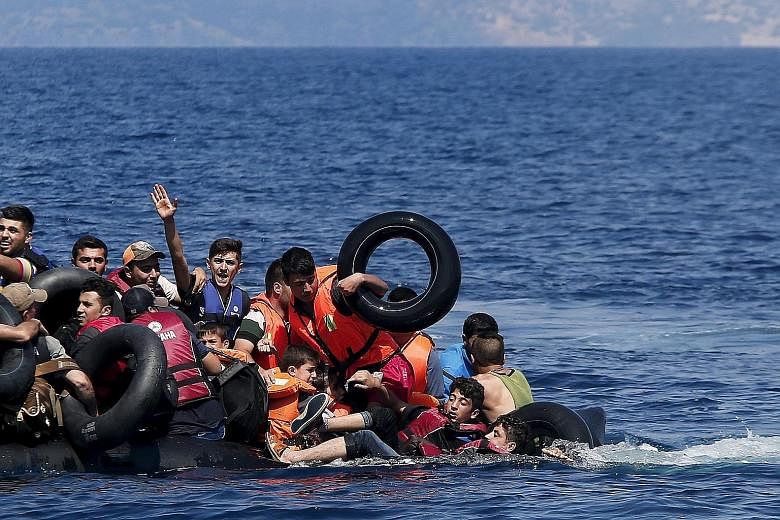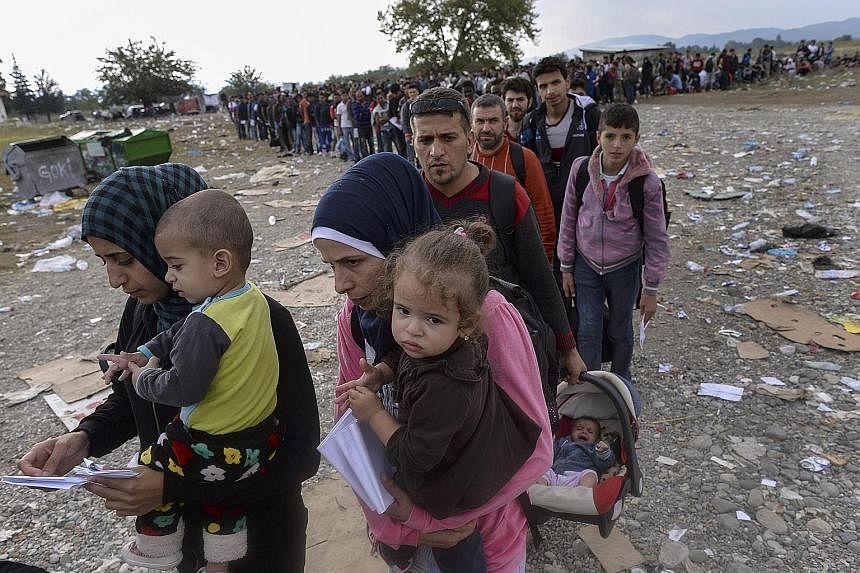ZAGREB (Croatia) • Croatia has thrown open its doors to thousands of refugees trying to enter the European Union (EU) after Hungary sealed its southern frontier, a main entry point that migrants had been using to enter the 28-member bloc.
"No one will stop them; no wire, no fences," Croatian Prime Minister Zoran Milanovic told Parliament yesterday in Zagreb. "We are ready to accept these people and, if you will, direct them to wherever they want to go with all their heart - and that is Germany, Scandinavia and several other countries."
Scores of refugees departed overnight from southern Serbia on Tuesday in at least 20 buses headed for Croatia, with the first group of mostly women and children arriving by crossing fields yesterday.
"It looks like Croatia is recognised as an alternative route after Hungary blocked its border," Health Minister Sinisa Varga told Soundset radio in Zagreb.
The daily number of migrants detained for trying to cross the border between Serbia and Hungary illegally plunged to 366 on Tuesday from a record 9,380 a day earlier, according to police data, after Hungary deployed thousands of soldiers to the frontier to enforce a new law making it a crime punishable by imprisonment to cross the border illegally.
Hungarian police launched criminal proceedings against 35 people on that day for illegally crossing the country's southern border with Serbia, state news agency MTI reported yesterday.
Amid rising tensions, Hungarian police fired tear gas and water cannon at protesting migrants demanding to be allowed to enter from Serbia yesterday. The action was taken after a group of migrants tried to break through a metal barrier.
The hardening of Hungary's position came as Austria started temporary checks yesterday at crossings with Hungary, following Germany's lead earlier this week to reinstate border controls.
Late on Tuesday, the state of Salzburg warned it could close the main train station as a safety measure due to the large number of people inside, after the border controls imposed by Germany resulted in the temporary suspension of all train services between Austria and Germany.
That led the hundreds of migrants, who had massed at the main train station in the Austrian city, to leave on foot yesterday in the hope of reaching Germany, a city spokesman said.
The reimposition of controls departs from an effort over the past 20 years to relax restrictions and open Europe's internal borders under what is known as the Schengen Agreement.
"Controlling means to make sure that traffickers are caught, to send the signal that someone who's not entitled to asylum can't rely on everything going on unchecked," Austrian Chancellor Werner Faymann said in an interview with public radio Oe1.
European Council president Donald Tusk will today announce whether there will be an emergency summit of EU leaders, as requested by German Chancellor Angela Merkel and Mr Faymann. EU interior ministers are set to gather again on Sept 22 to approve a plan to redistribute 120,000 refugees within the EU after failing to reach a consensus on the proposal on Monday.
Despite the introduction of controls at the Austrian border at the weekend, about 6,000 asylum-seekers arrived in the southern state of Bavaria on Tuesday, German police said. Last Saturday alone, 13,000 refugees had arrived at Munich central railway station.
The cost to Germany of taking the lead in Europe's migrant crisis, by accepting up to 1 million refugees a year over the next two years, may reach €25 billion (S$39 billion), according to research published yesterday. That is derived from a basic calculation of €12,500 per migrant, said Mr Peter Chatwell, senior rates strategist at Japanese investment bank Mizuho.
Google launched an online campaign yesterday to get users to donate to relief efforts for the migrant crisis. The California tech giant said it was donating €1 million to various relief organisations and would match donations from users up to an additional €5 million.
Meanwhile, Syrian President Bashar al-Assad has said that the West is "crying" for refugees flooding into Europe but its support for "terrorists" in his country lies at the root of the crisis.
Syria's government labels all those involved in the anti-Assad uprising and ensuing civil war as "terrorists", including Western-backed rebels.
"If you are worried about them, stop supporting terrorists... This is the core of the whole issue of refugees," he said in an interview. BLOOMBERG, AGENCE FRANCE-PRESSE, REUTERS


